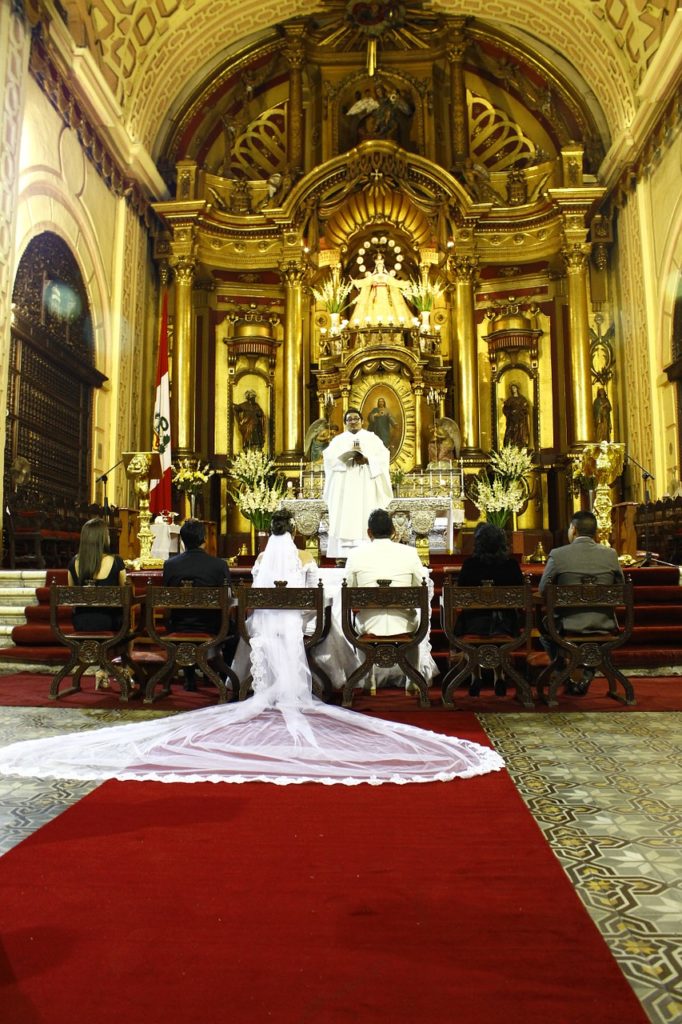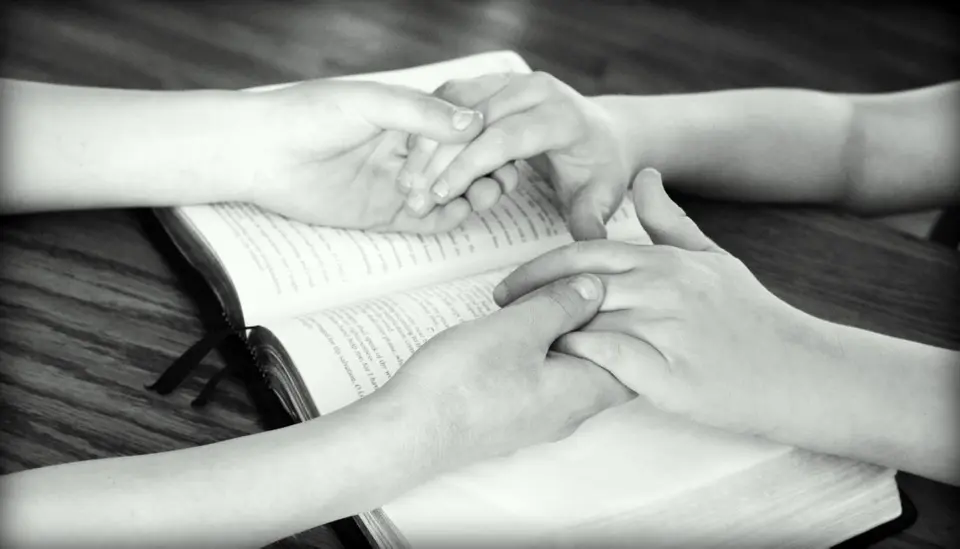
The short answer is no, remarriage after annulment is morally permissable.
The Catholic Church does not acknowledge divorce. In the Catholic mindset, marriage is not merely contractual, but sacramental. It is a permanent spiritual union formed by God, and it makes no more sense to speak of a couple becoming un-married than of a person becoming un-baptized. A divorce, the purpose of which is to dissolve an existing marriage, must then be quite impossible. This is why remarriage after divorce is considered to be adulterous; though a person may have parted ways with their first spouse, they are still married in the sacramental sense, and therefore bound to be faithful to each other according to the prescriptions of Christian marriage.
Remarriage after annulment, however, has totally different moral implications, because divorce and annulment are fundamentally different things.
What Is Annulment?
Annulment is not a “Catholic divorce.” The process should not be the first recourse if difficulties develop. Rather than seeking to dissolve a marriage, annulment is a process, governed by a tribunal, which takes the position after an extensive review that the marriage was never fully sacramentally valid. If it was not a valid marriage, the spouses are not bound to each other by a covenant with God. The Church may declare the marriage null, and both spouses are free to remarry.
What Happens in Marriage?
When a couple marries in the Catholic Church, they are bound both legally and sacramentally. They sign a marriage contract acknowledged by civil authorities granting them legal married status when they file for taxes, qualification as next of kin, joint ownership of property, etc. During the ceremony, they are also make sacramental vows before God and their community to regard each other according to the precepts of marriage, which are indissolubility, fidelity, and fertility. This means that their union is permanent, exclusive to the two of them, and open to the possibility of bearing children.
Divorce affects only the legal stipulations of a marriage, and it is not necessarily immoral for a married couple to contract one. None of the precepts of marriage state that a married couple must live together or have a joint bank account. If a relationship is abusive or unhealthy, especially if the safety of oneself or one’s children is threatened by proximity to the other spouse, it is absolutely permitted for the spouses to separate, and a legal divorce might be a component of such a separation.
In this situation the legal aspect of the marriage is dissolved, but the sacramental aspect is still in effect. Therefore, the spouses are still bound to the precept of exclusivity and cannot marry again without committing adultery. The Church acknowledges that such situations are difficult and painful, and maintains that reconciliation is the ideal solution if it can be achieved.
What if Spouses No Longer Are Reconcilable?
This is where annulment still offers a possibility that the spouses may be able to remarry without sin.
When a couple applies for an annulment, an investigation commences into the circumstances of their relationship at the time of the wedding. The investigation looks purely at one aspect: did a valid sacramental marriage actually take place? What canon law grounds or other aspects would apply to a possible annulment? For instance, if a valid marriage takes place but later the couple grows apart, or one or both spouses are unfaithful, this alone is not at all grounds for an annulment.
Criteria for Annulment
To prove that a marriage is invalid, the couple must provide evidence that falls into one of a few basic categories.
One or both spouses did not freely consent to the marriage
Because it is a personal covenant with the other spouse and with God, clear and conscious consent is absolutely indispensable to the validity of a marriage. The amount of spiritual investment presupposed in the very concept of marriage would be impossible without it. For this reason, any marriage is invalid if one or both spouses was not of sound mind at the time of the wedding, did not understand the nature of the commitment, was not fully conscious, or was compelled by some exterior force.
The couple did not intend to follow the Catholic precepts of marriage
Grounds of this sort might include evidence that the couple procured an abortion prior to the births of other children, indicating that they were not open to the precept of fertility. An extramarital affair could also render the marriage invalid if taking place at the time of the wedding, or if one or both of the spouses did not intend the marriage to be exclusive. Also, both spouses must understand the marriage is till “death do you part.” The marriage is indissoluble. Making a prenuptial agreement, for instance, admits a possibility the marriage could end and so is not permitted. No one must be held to promises that they never made, and the vow to follow these precepts must be conscious and sincere, or the marriage is not sacramentally valid.
The couple agreed to marry for reasons other than a wish to be married to each other
Into this category fall cases in which the couple did fully consent to marry each other, and perhaps even intended to follow the precepts of marriage, but came to this decision for the wrong reasons. For example, someone may have decided to get married so that they could come into an inheritance, or to obtain legal residence in a particular country. Marriages entered into mainly for reasons other than a vocation to live together in the divine office of matrimony are not considered to have the full validity of the sacrament.
One or both spouses deceived the other previous to the marriage on an issue that would have affected their decision to get married
For instance, if a spouse concealed infertility before the marriage and the other spouse married them believing that they could have children together, then they might submit that as evidence that they entered into the marriage on false pretenses.
Other such unwelcome surprises might include a preexisting venereal disease, previous incarceration, and a great many others. One stipulation to keep in mind is that this applies only to facts that were fully established at the time of the marriage. A wife may consider herself deceived on a grave issue if she marries a man who claimed to be a brain surgeon and turns out to be a drug smuggler, but not if she marries a man who said he was going to go to medical school to become a brain surgeon but never graduates. All commitments are made in the awareness that the future is uncertain, and a covenant does not disappear if things turn out differently than one hoped.
A precise and comprehensive account of legitimate grounds for annulment can be found in the Code of Canon Law.
Conclusion
All these grounds for invalidity concern the circumstances at the time of the wedding. If a couple knowingly consented to marry each other, was undeceived about the relevant facts of each other’s lives, and intended to follow the precepts of marriage in order to pursue a vocation in the office of matrimony, the marriage is valid no matter what goes wrong after that.
Many Catholics married in the Church apply for annulments when they have given up on the possibility of repairing their marriage and wish to remarry, sometimes years after separation and divorce. The annulment process can be rather prolonged, but is not usually as arduous as some believe it to be. Each case is investigated by a tribunal with three judges. Once the facts are established, the tribunal will either issue or deny a declaration of nullity based on their determination of the marriage’s validity.
In 2015, Pope Francis helped to streamline the process by placing responsibility for processing annulment applications on the shoulders of the local bishop and creating an avenue by which the more clear-cut cases can be processed through him directly. Tribunals were also encouraged to issue decisions promptly and free of charge whenever possible. These changes do not expand acceptable grounds for annulment; instead Pope Francis has made some purely logistical adjustments so that the many Catholics who have divorced and remarried outside the church will not be held back from returning to communion by a daunting bureaucracy.
Related Content
Jenna's pro-life work began in college when she headed the student organization Choose Life at Yale, and directed the annual Vita et Veritas pro-life conference. After studying abroad in Russia and working in Rome, she has returned to her beautiful hometown in Montana and supports life by writing articles for HLI and knitting adorable blankets for all the babies she knows.













You did not mention that one of the prerequisites was that both parties should be baptized. My first husband was not, and still not, baptized. Nor was he open to children, but neither was I at the time. The marriage quickly became emotionally abusive. It was my fault I got pregnant and the second time he commented that his life was already ruined. The annulment was quick once everybody filled out the forms. I am now happily married to a practicing Catholic in the Church for past 20 years.
You understood the situation correctly. Unfortunately the woman involved in this situation was 19 years old in the catholic marriage….she was not given detailed information at the pre wedding meetings with the priest Re the serious Church details on catholic marriage, divorce and etc. As it turned out the husband to be was unfaithful, alcoholic and abusive. This went on for 10 years until the divorce! Very sad.
What happens when a catholic and non catholic are married in the church and 10 years later divorce. The catholic has a civil ceremony to a non catholic divorced man… 45 years later the Husband dies. How does the Catholic wife become a true catholic again?
Dear Sandra,
Thank you for your question. This is a delicate matter, but the teaching of the Church is backed up by Christ himself, “And they two shall be in one flesh. Therefore now they are not two, but one flesh. What therefore God hath joined together, let not man put asunder.” Mark 10:8-9 Because the Catholic and non-Catholic were married in the Catholic Church they are still be married in the eyes of God despite being divorced under the laws of the land. As the Catechism of the Catholic Church teaches “between the baptized, a ratified and consummated marriage cannot be dissolved by any human power or for any reason other than death.” CCC 2382 The second marriage to the divorced man would not be recognized as a valid marriage as both parties are still married to their original spouses. If I understand correctly the second civil union ended with the death of the man; in this case the women would need to be reconciled to the Church and if the original husband is still alive remain chaste as she is still married to her husband of 55 years earlier. If there was some irregularity (one or both of the spouses was not open to life, was hiding infertility etc) in that wedding there is a possibility that they could seek an annulment. The Catholic wife never stopped being Catholic, she just needs to make her way back into full communion with the Church; for more in-depth information and to start that process she would want to go to confession and seek the advice of her local priest.
I hope this helps and that I understood the situation that you are describing correctly, if not, we are happy to research the situation further or clear up any misunderstandings.
HLI Staff
I am a Protestant converting to Catholicism. I was married to a Catholic in the Church in 1981. I filed for divorce, then remarried a baptized Catholic in a civil ceremony in 2009. We have a 13-year-old daughter. Heeding the call to convert, I filed for annulment and am waiting for the results. I am in RCIA, attending Mass faithfully every week, praying the Rosary, etc. My wife cannot receive the Eucharist and I cannot be received into the Church until the annulment is granted. My advocate thinks that I have very good grounds for the annulment and based on everything I’ve read, that seems to be the case. A 20 year-old sailor at the time, I had no intention of remaining faithful and was addicted to drugs, unbeknownst to my former spouse. My former spouse, was severely sexually abused as a child, abandoned by her biological father, so came into the marriage emotionally incapable of relating to me as an equal partner. Even with an apparently strong case for annulment, it is imprudent and premature to presume that the Tribunal will decide in my favor. My question is this: while waiting for the decision of the Tribunal, should my spouse and I refrain from marital relations? If so, how can we also avoid the sin of scandal?
Welcome home, Scott! Thank you for the thoughtful questions. You share quite a bit of information here, yet I hesitate to give advice specific to your situation that is better left to an expert. It is true that all are called to chastity outside of marriage. Is there a trusted priest you could consult regarding your specific situation?
Thanks for your response. I consulted with my Tribunal advocate and RCIA sponsor. Based on their feedback, my wife and I have decided to remain chaste pending the Tribunal’s decision and until we can be properly married in the Church. I’ve always known the Catholic Church’s teaching on marriage, but since I was a Protestant, did not believe it applied to me. Now that I’ve made the decision to convert, and am well-along in the process, it is time to submit to the Church’s teaching. Being an older couple makes the decision somewhat less burdensome and definitely causes me to feel a certain level of empathy for younger couples going through this process. But, the Lord’s teachings are sometimes “hard” and each of us have to take up our own cross and follow Him.
Dear Kathy, first let us tell you how sorry we are for all the difficulty with your abusive relationship; were you married? I am assuming so or you would not be discussing an annulment. There are many responses to your issues and the best place to do this for your privacy’s sake may not be a public forum like this one, but you were right to go to speak to your priest and attempt the annulment. If you could not complete it due to panic issues, or abuse issues, you need to get psychiatric meds to help resolve the anxiety – there is no shame in this! – and this can assist you, perhaps even counseling. If you are still under abuse threat, you also need to go to the law and get a restraining order, get a good lawyer and sort all that out. Then yes, when you are in a better place, you need to apply for the annulment if you were in a Catholic marriage. However, Mother Church in her wisdom and counseling organizations may well be able to assist. Perhaps there is a Christian counseling organization like a Catholic Charities that can help counsel you through the process, given your other issues. You mention that the priest blessed the two of you but this would not be a marriage, from the way you describe it. In any case, we don’t want to violate your privacy online, but do not give up and do your best to live in communion with all the Church teaches. You obviously love the Faith and care and we will be praying for you! Let us know if you need any assistance.
I was married for 29 years to an abusive man. Since I was baptized in the Catholic Church at 16 because of Catholic School and my deep love for the Lord, I stayed in this abusive relationship for 29 years and it almost killed me. An old boyfriend of mine reconnected and he too had gotten a divorce. For 9 years we talked on the phone as we lived on different continents. We eventually got together. We always went to church. I have talked and requested annulments 2 times and just could not complete the application without severe anxiety attacks. Bringing up the past was too painful and the paperwork was overwhelming. My Parish priest saw this. He also received a email from my sister who had witnessed me being threatened by my ex with a gun. That was not the only time. I was beaten, threatened. He decided to bless my 2nd marriage. In a very private ceremony with him, and us. It was such a relief. This was something we desired with our whole hearts and I will not let anyone tell me otherwise that what I believed to be married in the Catholic Church is invalid. If anyone were to tell me otherwise, I would consider leaving the Catholic Church which in my heart, would be devastating. Is not a priest who takes his vows to God, and from what I read even after abusive behavior, are still priests? I just get so confused now when I thought my husband and I were finally in a good place.
This is one of the things that actually has me questioning whether I want to convert to Catholicism. At 18 I decided to marry a man. He became an abusive alcoholic so 6 yrs later I had to divorce. A few yrs later I remarried. Domestic abuse to a spouse and children should be held up by any denomination as breaking the marriage covenant. Just an opinion the whole idea of marriage anullment through the church confuses me.
Hi Caite, thanks for reaching out. If you were not married in the Catholic Church, your marriage may not even be valid or require an annulment. For instance, if you were married in a civil ceremony with a justice of peace, you were married under the law of the USA, not the law of the Church, so that would not requirement annulment.
To marry in the Church, with optimal results, you need to a practicing Catholic. You have to understand the faith, that Marriage is Sacrament, and that Sacrements are outward signs instituted by God to give grace. You receive special graces, to help you forward in the matrimonial journey, and the marriage is to be for life. I am very sorry about the abuse situation you recommend. But church annulment is not divorce. You marry for better or worse, and if he is abusive, of course you may separate. But the only way to an annulment is to prove that there was an impediment morally in the marriage before you married him, that kept the marriage sacrament from not taking effect. One example that is an obvious one is to look to the marriage of Princess Diana and Charles. (Though obviously this was a non-Catholic ceremony.) If two marry, and it is discovered that one of the two was having an affair (a serious mortal sin) before, during and after, this is an impediment. An annulment would be granted in that he had no intention of keeping faith with his marriage vows.
We would suggest that if you are interested in the Church, you find a copy of the Baltimore Catechism – you can see excerpts online – and start to read. It starts with basic questions, like why did God make Heaven and Earth? And so on. We would also suggest that as your interest grows, you speak to a good, old-fashioned priest who knows his stuff, as we say, and can properly advise you in these matters. If you have any problems, you may write us at hli@hli.org and we will try to assist.
Can you only get an annulment in the diocese of which you were originally married? Or can it be any diocese?
Normally it is the diocese in which one is married, but this can change if the couple is no longer living in that diocese. For this you have to work with your original diocese, who may farm it out or not.
Thank you for teaching and reclarification.
I’d like to share my story because it may be helpful to others.
Greatful for the mercy shown. Unfortunately some of the priest unmerciful in the continued abuses.
Thank you for teaching and reclarification.
I’d like to share my story because it may be helpful to others.
Greatful for the mercy shown. Unfortunately some of the priest unmerciful in the continued abuses.
Not sure who you mean by “they” in your sentence. Either one trusts that the tribunal of three has the power of the Church to review extensively the case, based on Canon Law and all sorts of intricacies, and make a determination or not. As you must know, if even one judge says no, an annulment is not granted. We know of annulments not granted.
Are there too many divorces/annulments needed today? Probably, but what plays a role there? Lack of catechesis. How many couples wish to be married in the Church who do not know their faith, are cohabiting already, and do not even know what the Sacrament of Marriage means? Yet they demand to be married in the Church, and priests need courage to speak out and not marry those who are living in sin. Bishops need to stand behind priests. Pre-Cana teaching must be improved. Etc. This is a huge problem today, and one that must be rectified.
Dear Jenna, “None of the precepts of marriage state that a married couple must live together..”
CCC 2384 Divorce is a grave offense against the natural law. It claims to break the contract, to which the spouses freely consented, to *live with each other* till death.
Can you help us out here?
Thanks, John
Dear John, The article concerns annulment. You are misinterpreting the intent by taking the sentence out of context. As indicated, that statement this applies to special cases – abuse would be one – where the Church has been very clear couples are not required to live together. This does not mean they are free to remarry, unless an annulment is forthcoming. Thanks for your input.
You seem to presume that Catholic Annulments are accurate.
They have you fooled.